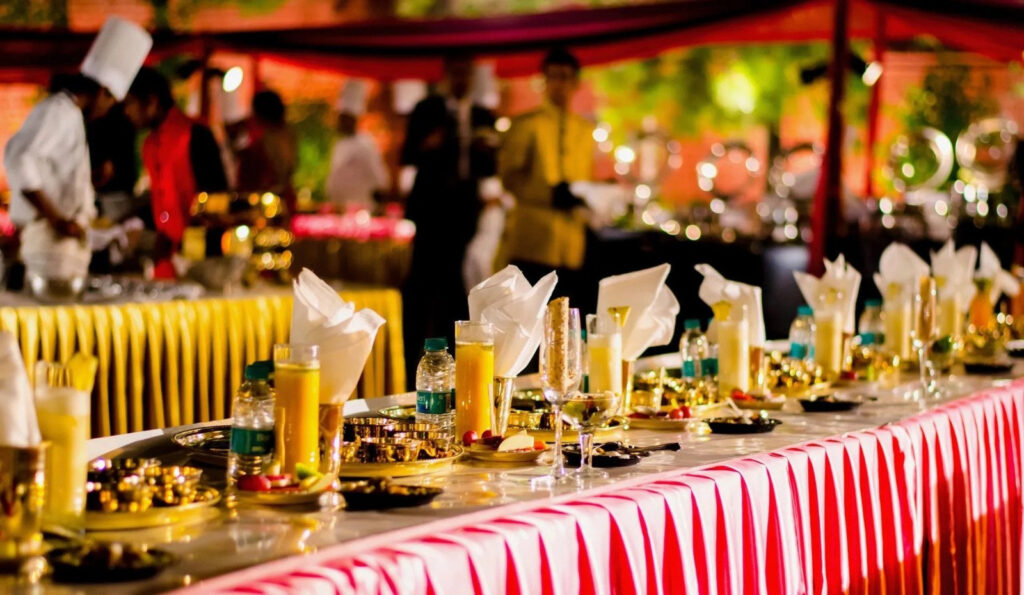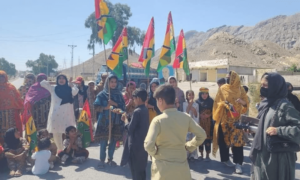PUBLISHED
January 19, 2025
KARACHI:
“Why, but why must we do it?”
“Because it’s a tradition.”
The topic under discussion was ‘Bride’s breakfast’—breakfast sent to the groom’s place by the bride’s family the day after the wedding. The conversation left me wondering where and how do such traditions emerge and why do we follow them, especially in these days of inflation when it’s difficult to make both ends meet.
In our part of the world, traditions abound, be it a wedding, a funeral, or some other occasion. They are passed on from one generation to the next, and people continue to follow them without thinking in practical and logical terms whether it is worth following them or not. While there is no harm in it, traditions shouldn’t be made a compulsion, especially if they are adding to the financial burden.
Weddings are the most celebrated occasions in our part of the world. We often go to great lengths to make our weddings grand and elaborate. There are many reasons for this—social pressure, the desire to display wealth, the need to show off, and so on. “Social media has added another layer, where events are designed to look good on our feeds, creating an aesthetic that feeds into public perception,” says Tehreem Azeem, Assistant Professor at Department of Mass Communication at National University of Science and Technology. “However, I believe these functions serve a deeper purpose. They are essential for introducing and familiarising extended families from both sides and maintaining connections with the extended family, fostering a sense of belonging, and ensuring that families feel involved throughout the process.”
Even before the wedding takes place, it is considered customary to make multiple visits, especially by the groom’s family to the bride’s home. While most people may consider it unreasonable, Tehreem has a point when she says, “What we sometimes overlook when discussing these events is the security they provide. There have been instances where men marry without involving their families, only to later abandon their wives, sometimes leaving them with children. Social accountability, enforced through extended family and community involvement, becomes a protective mechanism.”
However, Yasmeen Elahi, an elderly house wife reminds, “The joyful occasion of wedding sometimes becomes a nightmare for parents belonging to the middle class as multiple functions, a hefty dowry for the bride, and expensive gifts for the groom and his family not only lap up all the savings of a family but often leave them in debt. And all this is due to the “flaunt it all” mind-set of the filthy rich or the social pressure faced by the not-so-rich. Above all the “you get married only once” logic is behind creating new customs and worsening the old ones.”
“Customs and traditions are a burden on people,” says Nishat, a working woman in her early 60s. “If someone can afford to carry them out it is understandable but it should not be considered mandatory or compulsory for everyone to follow.”
“These traditions are more than just celebrations—they are a form of social protection,” says Tehreem. “My father, a jeweller, often advises relatives with daughters to gift significant amount of gold to the groom’s mother and sisters. He has seen first-hand how women are sometimes mistreated if they don’t bring enough dowry or gifts. In fact, he has shared stories of mothers-in-law coming to him after a wedding to have the purity of gold verified. It’s unfortunate, but this is the bitter cultural reality we navigate.”
Here, I am reminded of an instance where the jewellery given as gifts to the groom’s family included a gold bracelet for the groom’s grandmother who had passed away many years ago.
Gold is not just given as social protection but to the bride as investment so the girl will have something in hand in case a divorce takes place or God forbid the husband dies. “Giving gold as social security is old school,” argues Sana Hasan, in her mid-30s, working in the corporate sector. “How long will the gold last?” she asks. “Why not educate your daughters so if any misfortune befalls she is able to support herself and her children.”
Coming back to the ‘Bride’s breakfast’, whatever may be the logic, it is increasingly being shown in TV dramas and, watching it on TV, families feel compelled to follow the trend as girls now expect their families to bring breakfast. A family that has just married off their daughter the night before with much fanfare, is supposed to send her breakfast, one that is fancy and elaborate, and enough for the entire family.
“I don’t know from where this custom arose but it is totally laughable/deplorable,” says Yasmeen. “As if the new member of the family will have nothing to eat if her parents don’t send her nashta [breakfast]. And the huge amount of food to be sent burns a hole in the already worn-out pocket of the bride’s father!”
Hiba Sultan, a teacher, says, “The bride might want to see her family in the morning as she may be missing them, and since going empty-handed doesn’t look good, the concept of taking breakfast emerged.” However, traditionally, the bride visits her parents’ home on the day after the wedding; as it is important for her to break ice and settle with her new family.
“Traditions like sending breakfast may have some history or background as in the past people used to travel to another village,” says Nishat. Carrying her argument further Zahida, a senior, explains, “In olden days, weddings often used to take place in the afternoon especially if the baraat had to go back to some other town or village by train. Hence, some food was sent with the baraat to partake on the way.” This probably has taken the form of nashta since there is no need to give food to be eaten on the way.
It is heartening to see that some people are taking steps to break extravagant customs. Nishat shared the example of an invitation card from a well-off family who notified guests on the card that dinner would not be served. A brave and commendable step considering the lavish meals served on such occasions and the food that goes waste. There must have been critics—as we don’t have a shortage of naysayers—it was also appreciated by many. At least someone took the initiative. “The amount of money spent on such things can be better spent on arranging simple weddings of poor girls, education of poor children, or given to orphanages. It is true that many people are already doing this but a lot more is needed,” adds Nishat.
Many young couples getting married now prefer just one or two functions with close family members, and either saving for their future or sharing their special occasion with the poor by taking food to the orphanages, etc.
On the other hand, bridal and baby showers are trending and though at present, “They seem more like social media-driven events, primarily organised by the younger generation for the sake of having fun or aesthetically pleasing photos, it appears that in the next few years they may establish as customs/traditions to be followed rigidly,” says Tehreem.
Nishat believes that “TV dramas are presenting weddings in such a way that people who do not have the means also try to follow them. Bride’s breakfast as well as mehndi and other functions are shown as if it is something essential. Many young people insist on bridal showers, maayun, dholkis, and mehndi either on their own or their siblings’ weddings.
Weddings are not the only occasions when unnecessary customs are followed. The same is true for funerals. “While it is customary and appreciated as a good gesture to reach the home of the deceased to condole the bereaved family, what usually happens is disturbing. After offering their condolences, and staying for a bit to recite the Quran and leave, people comfortably settle in a corner, gossiping and waiting for a meal to be served. “This is another tradition which I detest,” says Yasmeen.
The custom was that relatives living close by or neighbours would bring some food to share with the bereaved family. The idea was to ease the burden on the bereaved family after the tragedy and ensure that in their grief they do not remain hungry. For this reason, someone would bring food and ensure that the grieving family eats. But now the members of the bereaved family have to serve the food that someone has brought, or after the soyem fateha the family begins to lay the tables, instead of receiving condolences in the hard time they are going through.
It all sounds unfair but Nazish, a teacher in her late 30s, who recently lost her father, says “Why shouldn’t we feed the guests? After all they are the guests and had come over to pray for my father. I should look after them. We made our mother sit and receive condolences and us sisters did the serving. Also, it is in keeping with our norms of hospitality.”
“The problem is that people have a lot of expectations, and sometimes even if you do not want to follow the traditions like serving dinner at soyem you have to do it as people expect it and would say that traditions are not followed,” says Nishat.
“In this era of spiralling inflation, where for the majority it is a struggle to make ends meet, people should have better sense, spend rationally and come out of the pressure of ‘Log kya kaheinge’,” says Yasmeen.
It’s true that many times people who do not like such customs and traditions have to, or are forced to, follow them, just because they are afraid of what people will say! I am reminded of a case where a lady used to openly speak out against serving meals on soyem and chehlum but when her husband died she had to give in to the pressure as her children said that people would say that the sons did not even observe ‘proper’ soyem if they do not serve meal to all those coming for Quran Khwani.
“Observing chehlum [40 days after death] and barsi [death anniversary], which are rituals of offering prayers for the deceased, have become wasteful customs which should be given up for good,” says Yasmeen. “Instead of sending the food to orphanages or distributing it among the poor, lavish meals are served to affluent guests. People either attend taking it as a social obligation or just to be a part of the gathering.”
Instead of blindly following wasteful traditions that hold our society in vicious clutches, one should stop and think whether these are worth the money and effort, and brace oneself to not pay any heed to ‘What would the people say’. And for this, there is no better way than to spread education with awareness, and of course better sense to help prioritise what genuinely fosters connection and support over mere tradition.
Rizwana Naqvi is a freelance journalist and tweets @naqviriz; she can be reached at naqvi59rizwana@gmail.com
All facts and information is the sole responsibility of the writer










